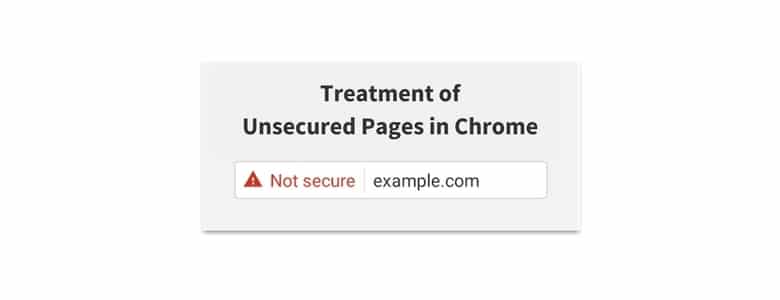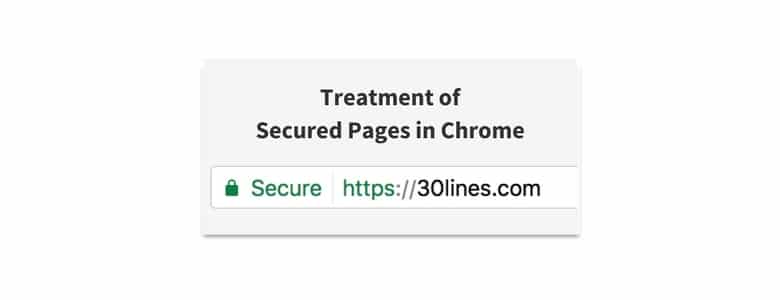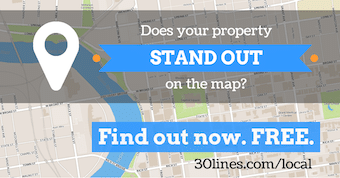FREE SSL for All 30 Lines Client Sites
30 Lines will provide FREE SSL to secure all websites we host for our clients.
Make this quick website update before your customers apply or pay rent online, and avoid a negative financial impact
Google Chrome is the most popular web browser today, with 37% of online users choosing it for their browsing experience.* That’s why you want to be in the know regarding Google’s release of version 56 of the Chrome web browser.
The recent update comes with an important warning that could severely impact apartment communities and property management companies who accept online applications, payments and other transactions that require personal information via their websites.
So what’s happening?
With the latest update to Chrome, Google is requiring that your website use HTTPS (HTTP Secure otherwise known as SSL or Secure Sockets Layer). Using HTTPS or SSL means that the information passed between the browser and your website is encrypted (or secure).
If your website is not using HTTPS, any user who visits the site to submit an application or make an online payment will receive a warning message that the website is not secure. This message will be displayed in the address bar, but could also be displayed more prominently on resident login pages or on payment pages (and in bright red text with a “warning” icon. Not pretty!).

“They’re already displaying prominent warnings in users’ browsers,” says 30 Lines President Mike Whaling. “Plus, we know Google is using site security as a ranking factor for SEO, and it’s easy to see where they could also show ‘Not Secure’ warnings in search results soon, further hurting the click-through rates to those sites not using https.”
What’s the impact?
Today’s consumers are hyper-aware when it comes to online security. Identity theft is more prevalent than ever. As much as they enjoy the convenience of it, security is a high priority. Not updating your website could mean a few things for you (and your on-site teams):
- A negative financial effect
The prospect who is excited, toured earlier today, is online this evening and ready to apply could receive this warning message, get spooked and click out of the website— all without renting.
The resident who is traveling for business on the first of the month logs into the online/resident portal to pay rent (as usual), sees the security warning and immediately feels uncomfortable entering their financial information. They’re now in a bind and trying to find an alternative payment method.
- Decreased morale among your on-site teams
Guess who will bear the brunt of these issues? Your on-site teams. Your leasing team could see a decrease in their closing ratios if prospects are getting turned off by applying online. Sales go down, morale goes down. There is no “win” here.
- A tarnished online reputation
You spent a lot of time selling your prospects and residents on the lifestyle of your communities— the convenience, the top-notch customer service, the intimate neighborhood setting. Only now to give them a reason to doubt that you have their very best interests at heart, especially when it comes to their personal financial security.
How can you fix it?
This Chrome update is Google’s way of forcing everyone to pay more attention to whether sites are secure or not. It’s really not a bad thing. After all, data security is part of the superior service that we should be offering our customers anyway. With your website properly secured, visitors should see an assuring green padlock that looks like this:

If your website is hosted and maintained by 30 Lines, we will automatically update your website to HTTPS (SSL)— at no extra cost to you. We stay on top of these trends so you don’t necessarily have to. We strive to keep your business at the forefront of both online marketing and security trends.
If your website isn’t hosted by 30 Lines, contact your website provider or your hosting company. Many providers offer free upgrades to SSL, while others offer installation guidelines so you can make the updates to the site yourself. If your website provider requires you to provide the SSL certificate, you can get them for free at Let’s Encrypt.
And as always, if you get stuck, drop us a line and we’ll do our best to help.
Keeping your apartment website secure puts your visitors first, and creates the user experience they’ve come to know and expect from you.
*Data Source: Netmarketshare.com January 2017




